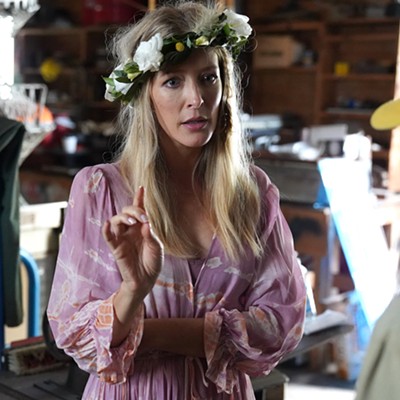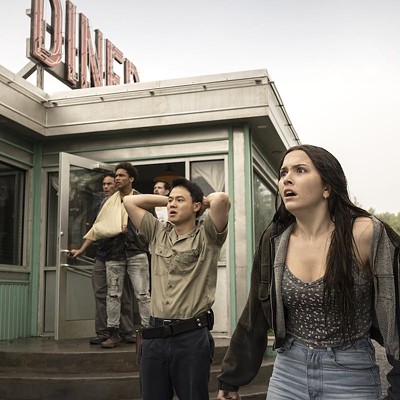Superbad includes one detail I've never seen in a teen movie before: The sight of kids drinking, and gagging after every swig. It's one of the small touches to display a smart attention to young life.
If you believe the hype, this comedy by director Greg Mottola and writers Seth Rogen and Evan Goldberg is the first teen movie of any significance since American Pie. Though set in the present, it has a generational universality with which critics can feel comfortable—while ignoring the genre's youth impact the rest of the time. I never connected with American Pie, finding its characters too bland to believe. Superbad's acclaim is misapplied to an originality it doesn't possess. It's superior to Pie because it makes genre conventions authentic.
Young leads Michael Cera and Jonah Hill, as altruistic Evan and spazmatic best friend Seth, capture the doom and hedonism of an age where the freedom of adulthood isn't yet levelled by experience. With the help of fellow outcast Fogell, AKA McLovin (Christopher Mintz-Plasse), the kids go in pursuit of booze and bush. Armed with delusions of sexual experience from hours spent watching porn, the boys venture to lose their virginity at one of the last parties of their high school lives.
Superbad is typical of the teen genre in the importance it places on losing one's virginity before graduating—a type of teen validation that exists mainly as an easy thing to make movies about. What distinguishes the movie's take on sexuality is that it doesn't hide behind conceits like giving the ugly girl a prom-queen makeover or dating someone on a bet before falling in love. Superbad makes teenage desire seem natural, which most teen movies fear.
Seth's curse-laden descriptions of what he wants to do to girls all break down to his drunken plea for acceptance. His cynicism counters the way Evan and McLovin seem amazed at what's happening to them. The movie allows Becca (Charlottetown's Martha MacIsaac), a girl who may be as interested in Evan as he is in her, a credible arc. Even the kooky cops (Rogen and Bill Hader) who take McLovin on a joyride hold their own colourful legitimacy. Add to it that Superbad is routinely very funny, and its high school experiences have depth.
The reason I'm not all the way behind Superbad is that its story is a retread of Reginald Hudlin's 1990 film House Party. Unfairly neglected, it stands up to anything in the John Hughes/Amy Heckerling pantheon. Both it and Superbad follow male best friends over a day and night. In both, they have their eyes on two girls at a big party, they struggle with responsibility (both social and sexual) and they evade the police and bullies wishing to ruin their fun. House Party is forgotten by critics. Nothing in Superbad equals the moment in House Party where stars Christopher "Kid" Reid and Tisha Campbell open up about their future hopes, taking their first steps to sexual understanding.
Mottola has the usual movie view of adolescence as the property of upper-middle-class white kids. He tries atoning for it with a soul and hip-hop soundtrack, but the homogeny is suspect. There's also a nagging feeling that Superbad's been consciously designed for reviewers to praise the sweetness underneath its crude humour. It's a movie that wants very badly to be a landmark, and that undermines its sincerity. Within its limited viewpoint, Superbad's success as a high school movie is in making high school recognizable. It remembers those years for the surreal details, thrill of survival and big laughs they were worth.
For showtimes click here. Reminisce by emailing [email protected].












